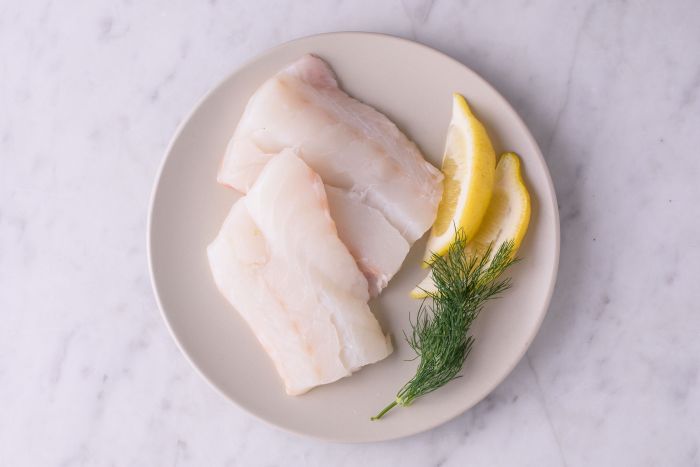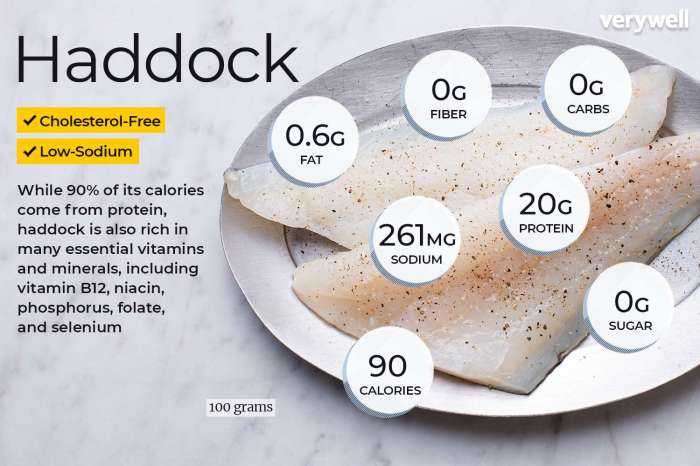Nutritional Composition of 8 oz Cod

8 oz cod nutrition facts – An 8-ounce serving of cod offers a lean and nutritious protein source, relatively low in fat and carbohydrates, making it a popular choice for health-conscious individuals. This detailed breakdown explores the specific macronutrients, vitamins, minerals, and beneficial fatty acids found in this serving size. Understanding this composition allows for informed dietary choices and helps to appreciate cod’s role in a balanced diet.
Macronutrient Profile of 8 oz Cod, 8 oz cod nutrition facts
The macronutrient composition of cod provides a foundation for understanding its caloric contribution and its role in energy provision and satiety. The following table details the macronutrients in an 8-ounce serving:
| Nutrient | Amount | % Daily Value | Unit |
|---|---|---|---|
| Protein | 34g | 68% | grams |
| Fat | 1.5g | 2% | grams |
| Carbohydrates | 0g | 0% | grams |
Note
Daily Value percentages are based on a 2,000 calorie diet and may vary depending on individual needs.
Considering the lean protein and omega-3s in 8 oz of cod, we see a healthful choice, but balance is key. For a refreshing, calorie-free complement to a balanced diet, explore the nutritional profile of unsweetened tea nutrition facts , which pairs well with the lighter fare of fish like cod. Remember, mindful consumption of both contributes to overall well-being, just as a balanced spiritual life nourishes the soul.
Micronutrient Content of 8 oz Cod
Cod is a surprisingly rich source of several essential vitamins and minerals crucial for various bodily functions. The table below highlights some key micronutrients found in an 8-ounce serving:
| Nutrient | Amount | % Daily Value | Unit |
|---|---|---|---|
| Vitamin B12 | 2.4 mcg | 100% | micrograms |
| Vitamin D | 40 IU | 2% | International Units |
| Selenium | 37 mcg | 53% | micrograms |
| Phosphorus | 240 mg | 24% | milligrams |
| Potassium | 360 mg | 8% | milligrams |
| Niacin | 5mg | 31% | milligrams |
Note
Daily Value percentages are based on a 2,000 calorie diet and may vary depending on individual needs. The actual amounts may slightly vary depending on the specific cod species and its environment.
Omega-3 Fatty Acid Composition and Health Benefits in 8 oz Cod
Cod is a valuable source of omega-3 fatty acids, particularly EPA (eicosapentaenoic acid) and DHA (docosahexaenoic acid). These essential fatty acids are not produced by the body and must be obtained through diet. An 8-ounce serving of cod contains a notable amount of these beneficial fats.EPA and DHA are vital for maintaining cardiovascular health, reducing inflammation, and supporting brain function.
Studies have linked regular consumption of omega-3 fatty acids to a lower risk of heart disease, stroke, and certain types of cancer. The anti-inflammatory properties of these fatty acids can also alleviate symptoms associated with arthritis and other inflammatory conditions. While the exact amounts of EPA and DHA in cod can vary depending on factors like its diet and environment, a typical 8-ounce serving provides a significant contribution to the daily recommended intake of these essential nutrients.
Further research continues to explore the full range of health benefits associated with omega-3 fatty acid consumption.
Cod vs. Other Fish

Choosing the right fish for your diet involves understanding the nutritional nuances of different species. While cod is a lean protein source, its nutritional profile differs significantly from other popular fish like salmon, tuna, and tilapia. This comparison will highlight key differences in macronutrients and micronutrients to help inform your dietary choices.
Comparing the nutritional composition of various fish provides a valuable insight into the diverse benefits they offer. Understanding these differences allows for a more informed selection based on individual dietary needs and preferences.
Macronutrient and Micronutrient Comparison
The following bullet points detail key differences in the macronutrient and micronutrient composition of 8 ounces of cod compared to salmon, tuna, and tilapia. These variations stem from differences in the fish’s natural habitat, diet, and species-specific metabolic processes.
- Cod: Generally lower in fat, particularly saturated fat, than salmon and tuna. It’s a good source of protein and several B vitamins. Omega-3 fatty acid content is lower compared to salmon and tuna.
- Salmon: Significantly higher in fat than cod, but much of this fat is composed of healthy omega-3 fatty acids (EPA and DHA), crucial for heart health and brain function. It also boasts higher levels of vitamin D and astaxanthin, a powerful antioxidant.
- Tuna: Similar to salmon in its higher fat content and omega-3 fatty acid profile, though the specific types and amounts may vary depending on the tuna species. It’s a good source of selenium and niacin.
- Tilapia: A leaner fish like cod, but with a lower omega-3 fatty acid content. It provides a good source of protein and is relatively low in calories. However, it may have lower levels of certain vitamins and minerals compared to the other fish mentioned.
Macronutrient Content Comparison
This table summarizes the calorie, protein, and fat content of 8 ounces of each fish type, providing a quantitative comparison of their macronutrient profiles. Note that values can vary slightly depending on the specific preparation and sourcing of the fish.
| Fish Type | Calories (approx.) | Protein (grams) (approx.) | Fat (grams) (approx.) |
|---|---|---|---|
| Cod | 130-150 | 25-30 | 2-5 |
| Salmon | 200-250 | 25-30 | 10-15 |
| Tuna (Albacore) | 200-250 | 30-35 | 10-15 |
| Tilapia | 120-140 | 25-30 | 2-4 |
Omega-3 Fatty Acid Content
Omega-3 fatty acids, particularly EPA and DHA, are essential for various bodily functions. The following details the differences in omega-3 content between cod, salmon, and tuna, emphasizing the significant variations between these species. These differences are largely attributed to their diet and habitat.
- Cod contains smaller amounts of omega-3s compared to salmon and tuna. While it does offer some benefits, it’s not as potent a source as the other two.
- Salmon is renowned for its high concentration of EPA and DHA, contributing significantly to its health benefits. The specific amounts can vary based on the type of salmon and its diet (wild-caught salmon generally have higher levels).
- Tuna, particularly albacore tuna, also contains substantial levels of omega-3s, though the profile might differ slightly from salmon. The type of tuna significantly influences its omega-3 content.
Health Benefits Associated with Cod Consumption: 8 Oz Cod Nutrition Facts

Cod, a lean white fish, offers a wealth of nutritional benefits that contribute significantly to overall health and well-being. Its rich profile of vitamins, minerals, and high-quality protein makes it a valuable addition to a balanced diet, impacting various bodily systems positively. The following sections will detail how cod’s nutritional components contribute to improved heart health, brain function, and overall wellness.
Cod’s Contribution to Heart Health
Cod is a superb source of omega-3 fatty acids, specifically EPA and DHA. These essential fatty acids are renowned for their cardiovascular benefits. They help reduce triglyceride levels, lower blood pressure, and decrease the risk of blood clot formation, all critical factors in preventing heart disease. The high protein content in cod also aids in maintaining healthy blood pressure and cholesterol levels.
Furthermore, cod is low in saturated fat, a type of fat linked to increased risk of heart disease. This combination of beneficial fatty acids and low saturated fat makes cod a heart-healthy choice.
Cod and Brain Function
The omega-3 fatty acids in cod, particularly DHA, are crucial for brain health and cognitive function throughout life. DHA is a major structural component of brain cell membranes, influencing their fluidity and function. Adequate DHA intake is associated with improved memory, concentration, and overall cognitive performance. Studies have linked higher omega-3 consumption to a reduced risk of age-related cognitive decline and neurodegenerative diseases such as Alzheimer’s disease.
Additionally, the vitamin B12 present in cod plays a vital role in nerve function and the production of red blood cells, indirectly supporting brain health.
Overall Well-being Benefits of Cod Consumption
Beyond heart health and brain function, cod contributes to overall well-being in several ways. Its high-quality protein is essential for building and repairing tissues, supporting muscle growth, and maintaining a healthy immune system. The presence of various vitamins and minerals, such as vitamin D, selenium, and potassium, further enhances its contribution to overall health. Vitamin D is crucial for calcium absorption and bone health, while selenium acts as an antioxidant, protecting cells from damage.
Potassium plays a role in maintaining healthy blood pressure. The combination of these nutrients contributes to a robust and resilient body, promoting overall well-being.
Potential Health Risks Associated with Excessive Cod Consumption
While cod offers numerous health benefits, excessive consumption may pose certain risks. High intake of cod liver oil, rich in vitamin A, can lead to hypervitaminosis A, characterized by symptoms like nausea, headaches, and bone pain. Individuals with impaired kidney function should also exercise caution, as the high protein content in cod may place additional strain on their kidneys.
Furthermore, cod, like other seafood, can contain mercury, though generally at levels considered safe for most people. However, pregnant women and young children should be mindful of their cod consumption due to potential mercury exposure. Finally, allergic reactions to cod are possible, although relatively uncommon.
Frequently Asked Questions
Is cod high in mercury?
Cod is generally considered a low-mercury fish, making it a safe and healthy choice for regular consumption.
Can I eat cod every day?
While cod is nutritious, dietary variety is key. Aim for a balanced intake of various proteins throughout the week.
How should I store fresh cod?
Store fresh cod in the refrigerator, wrapped tightly, for up to 2 days. Freezing extends its shelf life significantly.
Is frozen cod as nutritious as fresh cod?
Freezing cod generally preserves its nutritional value. Ensure proper freezing and thawing techniques for optimal quality.
